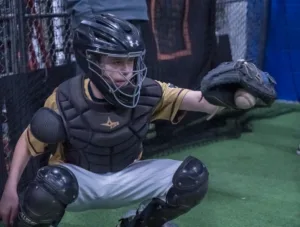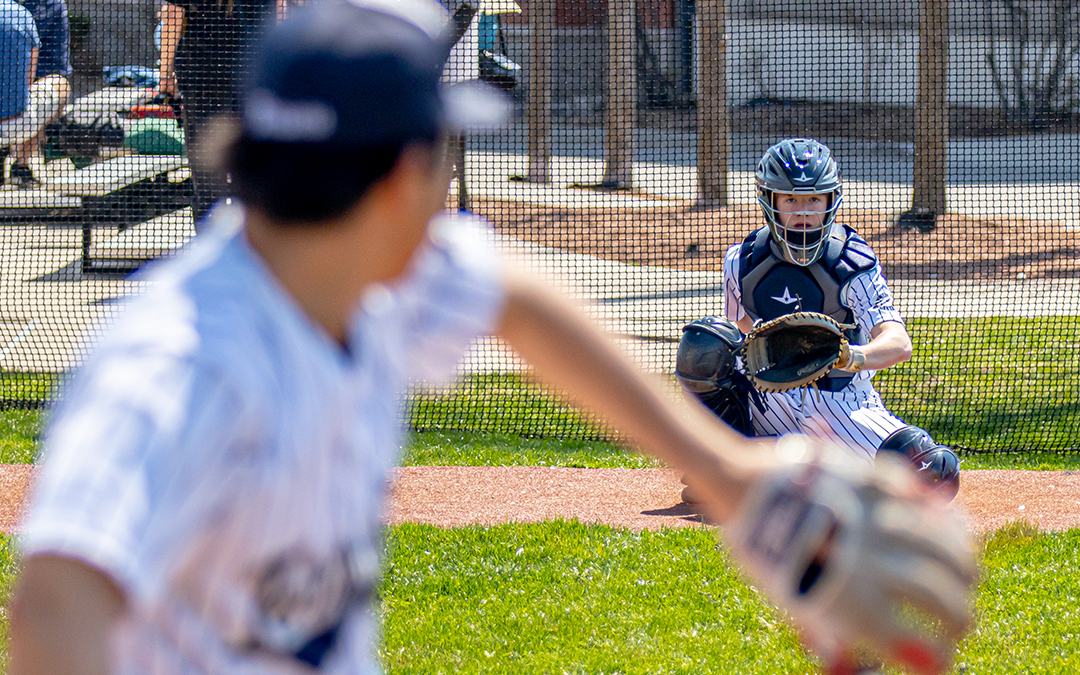Author: Jayson Eljawhary
In the world of baseball, each player has a vital role to play in the team’s success. While the spotlight will often shine on pitchers for their impressive velocity or strikeout rate, or batters for their power and consistency, there is another player on the field whose impact on the game is sometimes underrated and underappreciated – the catcher. Often referred to as the backbone of the team, catchers are the unsung heroes who quietly orchestrate the game from behind the plate. In this blog, we will discuss the art of being a good catcher in baseball and five key attributes that will make you the most successful at the position.
Leadership and Communication:
A good catcher should be a natural leader on the field. They are considered the quarterback of the defense, directing plays and strategies to their teammates. Good communication is key, whether it’s signalling pitches to their pitcher, providing instruction to their infielders and outfielders, or offering encouragement to the team. Their leadership and communication on the field is maintained at all times, whether the game is close and high-pressure, or out of hand and difficult to get through.
Baseball Sense:
Catchers need to have an in-depth understanding of the game, including the strengths and weaknesses of their own team and the opposing team if possible. Good catchers will pay attention to pitch sequencing and the opposing hitters’ tendencies throughout the game, and make adjustments as needed. They are able to learn from their mistakes and make split-second decisions, such as calling a specific pitch in a specific situation or adjusting the defensive alignment based on the game scenario.

Defensive Prowess:
Have you ever watched an MLB game and wondered why a catcher with a poor batting average and/or on-base percentage is on the roster? The chances are, this catcher was not on the roster to drive in runs, but because of their defensive prowess. Defense is where catchers truly shine – they must excel at multiple facets of the game, including blocking pitches in the dirt, framing pitches to deceive umpires, and throwing out baserunners attempting to steal. A good catcher possesses quick reflexes, soft hands, and good timing behind the plate. Simply put, the value of having a strong defensive catcher can outweigh the importance of their contributions as a hitter!
Handling Pitchers:
Catchers are responsible for establishing a rapport with their pitchers and understanding their individual preferences and comfort zones. They serve as the pitcher’s eyes and ears on the field, providing feedback and adjustments as needed. Building trust and confidence with pitchers is essential for success, as it fosters a sense of cohesion and teamwork that can elevate the entire team’s performance. As a catcher, building chemistry with a pitcher can also result in them having more confidence in their arsenal, while a lack of trust from your pitcher can lead to less consistency and have negative effects in performance.
Mental Toughness:
Baseball is a game of highs and lows, and catchers must possess unwavering mental toughness to conquer the challenges they will face. Whether it is dealing with a tough loss, overcoming errors, or enduring physical fatigue, resilience is paramount. They must remain composed under pressure, and maintain focus and intensity throughout the game. This is effectively true for all players on the field, but as the defensive pillar and leader of the team, a catcher’s actions under pressure can have higher benefits or bigger consequences. A catcher who keeps his team composed instead of compounding mistakes will be rewarding to any team as it faces adversity.
In conclusion, being a good catcher in baseball requires a unique combination of leadership, baseball sense, defensive prowess, and mental toughness. While it is a physically and mentally demanding position that requires hard work, dedication, and passion, those who embrace the challenge will reap the rewards personally and make an invaluable contribution to their team. So, the next time you watch a baseball game, take a moment to appreciate the catcher behind the plate, as they make their presence felt as an invaluable strategist and defensive leader of their team.
To learn more check out our The Baseball Zone Catching Clinics throughout the year.


